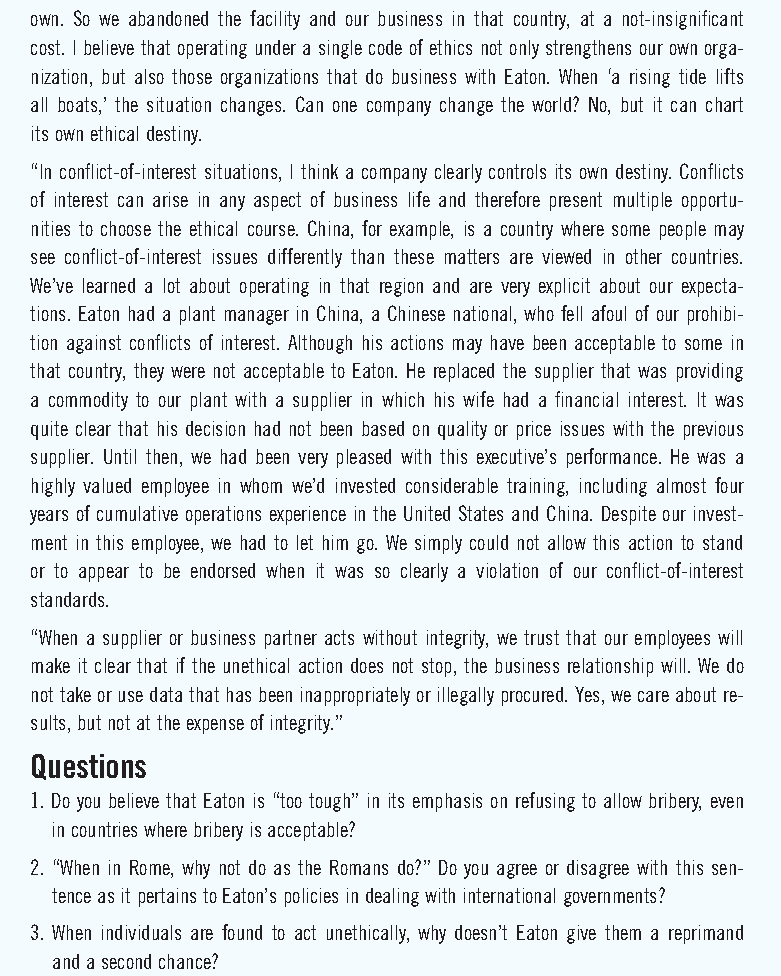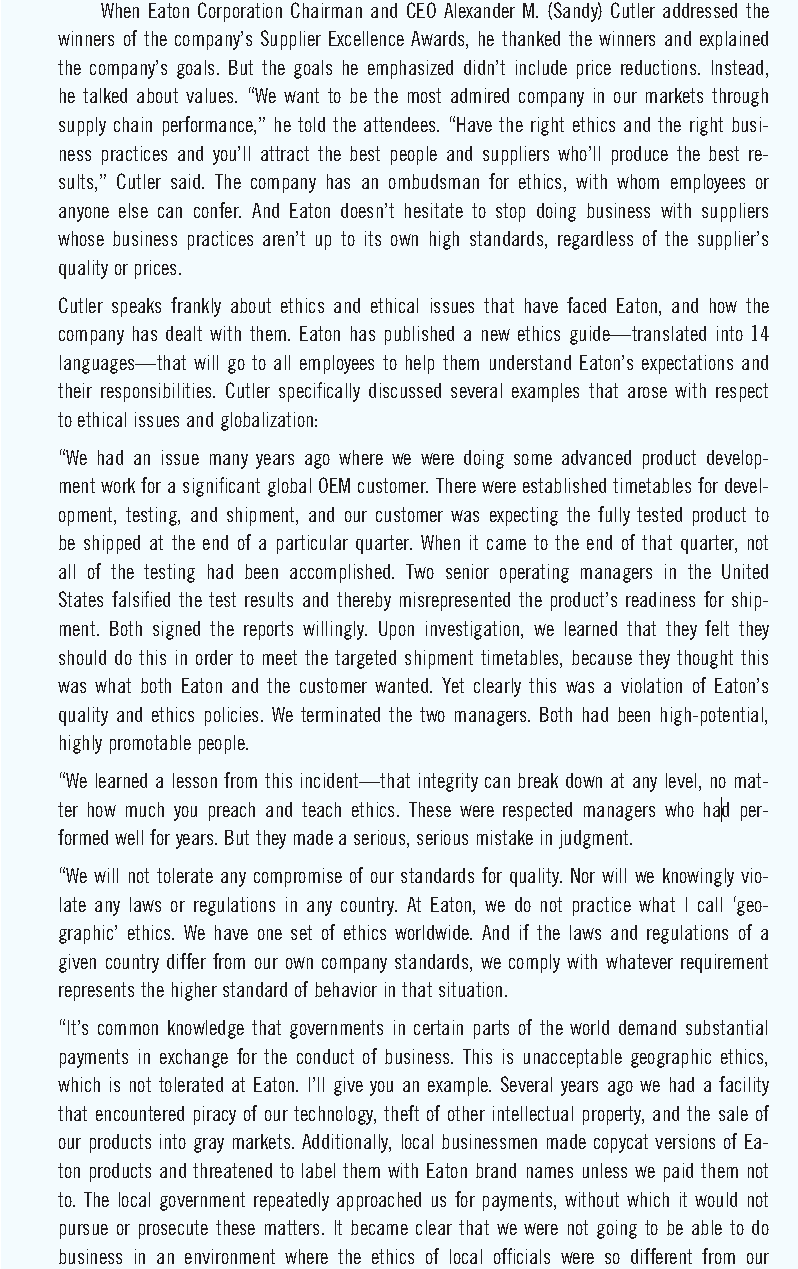1. Do you believe that Eaton is “too tough” in its emphasis on refusing to allow bribery, even in countries where bribery is acceptable? 2. “When in Rome, why not do as the Romans do?” Do you agree or disagree with this sentence as it pertains to Eaton’s policies in dealing with international governments? 3. When individuals are found to act unethically, why doesn’t Eaton give them a reprimand and a second chance?
1. Do you believe that Eaton is “too tough” in its emphasis on refusing to allow bribery, even in countries where bribery is acceptable? 2. “When in Rome, why not do as the Romans do?” Do you agree or disagree with this sentence as it pertains to Eaton’s policies in dealing with international governments? 3. When individuals are found to act unethically, why doesn’t Eaton give them a reprimand and a second chance?
Practical Management Science
6th Edition
ISBN:9781337406659
Author:WINSTON, Wayne L.
Publisher:WINSTON, Wayne L.
Chapter2: Introduction To Spreadsheet Modeling
Section: Chapter Questions
Problem 20P: Julie James is opening a lemonade stand. She believes the fixed cost per week of running the stand...
Related questions
Question
1. Do you believe that Eaton is “too tough” in its emphasis on refusing to allow bribery, even
in countries where bribery is acceptable?
2. “When in Rome, why not do as the Romans do?” Do you agree or disagree with this sentence
as it pertains to Eaton’s policies in dealing with international governments?
3. When individuals are found to act unethically, why doesn’t Eaton give them a reprimand
and a second chance?

Transcribed Image Text:Own. So we abando ned the facility and our business in that country, at a not-insignificant
cost. I believe that operating under a single code of ethics not only strengthens our own orga-
nization, but also those organizations that do business with Eaton. When 'a rising tide lifts
all boats,' the situation changes. Can one company change the world? No, but it can chart
its own ethical destiny.
"In conflict-of-interest situations, I think a company clearly controls its own destiny. Conflicts
of interest can arise in any aspect of business life and therefore present multiple opportu-
nities to choose the ethical course. China, for example, is a country where some people may
see conflict-of-interest issues differently than these matters are viewed in other countries.
We've learned a lot about operating in that region and are very explicit about our expecta-
tions. Eaton had a plant manager in China, a Chinese national, who fell afoul of our prohibi-
tion against conflicts of interest. Although his actions may have been acceptable to some in
that country, they were not acceptable to Eaton. He replaced the supplier that was providing
a commodity to our plant with a supplier in which his wife had a financial interest. It was
quite clear that his decision had not been based on quality or price issues with the previous
supplier. Until then, we had been very pleased with this executive's performance. He was a
highly valued employee in whom we'd invested considerable training, including almost four
years of cumulative operations experience in the United States and China. Despite our invest-
ment in this employee, we had to let him go. We simply could not allow this action to stand
or to appear to be endorsed when it was so clearly a violation of our conflict-of-interest
standards.
"When a supplier or business partner acts without integrity, we trust that our employees will
make it clear that if the unethical action does not stop, the business relationship will. We do
not take or use data that has been inappropriately or illegally procured. Yes, we care about re-
sults, but not at the expense of integrity."
Questions
1. Do you believe that Eaton is "too tough" in its emphasis on refusing to allow bribery, even
in countries where bribery is acceptable?
2. "When in Rome, why not do as the Romans do?" Do you agree or disagree with this sen-
tence as it pertains to Eaton's policies in dealing with international governments?
3. When individuals are found to act unethically, why doesn't Eaton give them a reprimand
and a second chance?

Transcribed Image Text:When Eaton Corporation Chairman and ČEO Alexander M. (Sandy) Cutler addressed the
winners of the company's Supplier Excellence Awards, he thanked the winners and explained
the company's goals. But the goals he emphasized didn't include price reductions. Instead,
he talked about values. "We want to be the most admired company in our markets through
supply chain performance," he told the attendees. "Have the right ethics and the right busi-
ness practices and you'll attract the best people and suppliers who'll produce the best re-
sults," Cutler said. The company has an ombudsman for ethics, with whom employees or
anyone else can confer. And Eaton doesn't hesitate to stop doing business with suppliers
whose business practices aren't up to its own high standards, regardless of the supplier's
quality or prices.
Cutler speaks frankly about ethics and ethical issues that have faced Eaton, and how the
company has dealt with them. Eaton has published a new ethics guide-translated into 14
languages that will go to all employees to help them understand Eaton's expectations and
their responsibilities. Cutler specifically discussed several examples that arose with respect
to ethical issues and globalization:
"We had an isue many years ago where we were doing some advanced product develop-
ment work for a significant global OEM customer. There were established timetables for devel-
opment, testing, and shipment, and our customer was expecting the fully tested product to
be shipped at the end of a particular quarter. When it came to the end of that quarter, not
all of the testing had been accomplished. Two senior operating managers in the United
States falsified the test results and thereby misrepresented the product's readiness for ship-
ment. Both signed the reports willingly. Upon investigation, we learned that they felt they
should do this in order to meet the targeted shipment timetables, because they thought this
was what both Eaton and the customer wanted. Yet clearly this was a violation of Eaton's
quality and ethics policies. We terminated the two managers. Both had been high-potential,
highly promotable people.
"We learned a lesson from this incident-that integrity can break down at any level, no mat-
ter how much you preach and teach ethics. These were respected managers who had per-
formed well for years. But they made a serious, serious mistake in judgment.
"We will not tolerate any compromise of our standards for quality. Nor will we knowingly vio-
late any laws or regulations in any country. At Eaton, we do not practice what I call 'geo-
graphic' ethics. We have one set of ethics worldwide. And if the laws and regulations of a
given country differ from our own co mpany standards, we comply with whatever requirement
represents the higher standard of behavior in that situation.
"It's common knowledge that govern ments in certain parts of the world demand substantial
payments in exchange for the conduct of business. This is unacceptable geographic ethics,
which is not tolerated at Eaton. I'll give you an example. Several years ago we had a facility
that encountered piracy of our technology, theft of other intellectual property, and the sale of
our products into gray markets. Additionally, local businessmen made copycat versions of Ea-
ton products and threatened to label them with Eaton brand names unless we paid them not
to. The local government repeatedly approached us for payments, without which it would not
pursue or prosecute these matters. It became clear that we were not going to be able to do
business in an environment where the ethics of local officials were so different from our
Expert Solution
This question has been solved!
Explore an expertly crafted, step-by-step solution for a thorough understanding of key concepts.
This is a popular solution!
Trending now
This is a popular solution!
Step by step
Solved in 2 steps

Recommended textbooks for you

Practical Management Science
Operations Management
ISBN:
9781337406659
Author:
WINSTON, Wayne L.
Publisher:
Cengage,

Operations Management
Operations Management
ISBN:
9781259667473
Author:
William J Stevenson
Publisher:
McGraw-Hill Education

Operations and Supply Chain Management (Mcgraw-hi…
Operations Management
ISBN:
9781259666100
Author:
F. Robert Jacobs, Richard B Chase
Publisher:
McGraw-Hill Education

Practical Management Science
Operations Management
ISBN:
9781337406659
Author:
WINSTON, Wayne L.
Publisher:
Cengage,

Operations Management
Operations Management
ISBN:
9781259667473
Author:
William J Stevenson
Publisher:
McGraw-Hill Education

Operations and Supply Chain Management (Mcgraw-hi…
Operations Management
ISBN:
9781259666100
Author:
F. Robert Jacobs, Richard B Chase
Publisher:
McGraw-Hill Education


Purchasing and Supply Chain Management
Operations Management
ISBN:
9781285869681
Author:
Robert M. Monczka, Robert B. Handfield, Larry C. Giunipero, James L. Patterson
Publisher:
Cengage Learning

Production and Operations Analysis, Seventh Editi…
Operations Management
ISBN:
9781478623069
Author:
Steven Nahmias, Tava Lennon Olsen
Publisher:
Waveland Press, Inc.